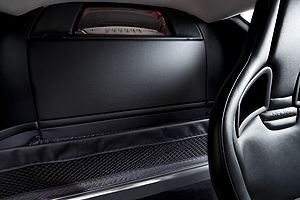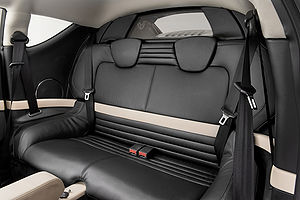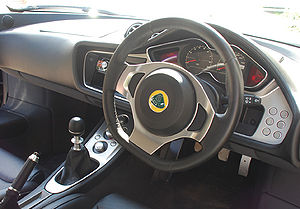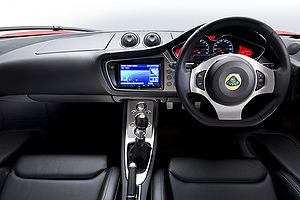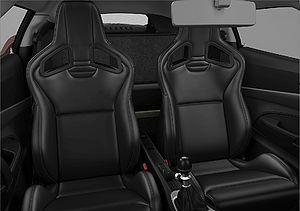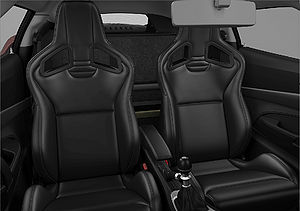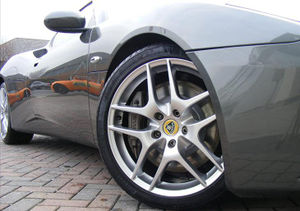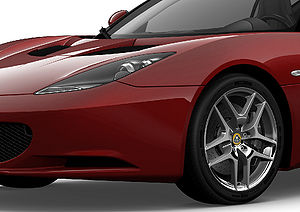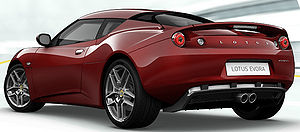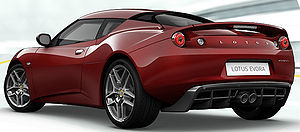Evora Buyers Guide
This page is designed to serve as a preliminary buyers guide for those interested in the Lotus Evora.
As the Evora is a relatively new car, with all still under warranty at the time of writing, but we'll be adding advice and information over time.
Running Costs
Servicing
Servicing on the Evora and Evora S is carried out on a 1 year or 9,000 mile basis.
These services vary in price from around £425 up to £699, with alternating Minor and Major services.
You can find the servicing schedule for the Evora on the Servicing page, and get an idea of pricing on the Servicing Costs entry.
Tax Bands
| Model | Emissions (Combined Cycle) | Tax Band | 1st Year Tax Rate | Annual Tax Rate |
|---|---|---|---|---|
| Evora MY10 | 205g/km CO2 | K | £580 | £250 |
| Evora MY11 | 199g/km CO2 | J | £445 | £235 |
| Evora Sports Gearbox | 215g/km CO2 | K | £580 | £250 |
| Evora IPS | 208g/km CO2 | K | £580 | £250 |
| Evora S | 239g/km CO2 | L | £790 | £435 |
Consumables
These prices are for parts only, including VAT but exclude delivery and fitting.
Many of the consumables for the Evora such as oil and air filters are Toyota parts, and so are quite reasonably priced. Be aware however that if the car is equipped with the 19" front and 20" rear wheels the OE fitment Pirelli P Zero Corsa tyres are considerably more expensive than the regular Pirelli P Zero's fitted as standard to 18" front and 19" rear wheel combinations. Rear tyre wear has also been reported to be somewhat higher than expected with the standard tyres, so it is not uncommon for owners to try alterative brands.
| Item | Price | Part Number | Vendor | Date |
|---|---|---|---|---|
| Tyres | Front: £130.20 (Pirelli P Zero) Rear: £265.90 (Pirelli P Zero) Front (19"): £238.50 (Pirelli P Zero Corsa) Rear (20"): £442.70 (Pirelli P Zero Corsa) |
Front: A132G6005F Rear: A132G6006F |
Camskill | 11/11/2011 |
| Brake Pads | Front: £211.03 (AP Racing - OEM Fitment) Rear: £211.03 (AP Racing - OEM Fitment) |
Front: A132J0001S Rear: A132J0002S |
Elise-shop | 09/08/2011 |
| Brake Discs | ||||
| Clutch | Friction Plate: £180.48 | C132F0015F | Elise-shop | 09/08/2011 |
| Oil Filter | £33.60 | A132E6399S | Elise-shop | 09/08/2011 |
| Air Filter | £38.69 | A132E6324S | Elise-shop | 09/08/2011 |
Recalls
Below is a list of recalls made to the Evora since it release - this list is assumed to be incomplete at present.
| Title | Date | Summary | VINs affected | Link |
|---|---|---|---|---|
| Heater/a.c. unit drain tube freezing causing poor demist performance | 01/02/2010 | Fix to solve poor demisting performance during the winter months due to water freezing and blocking the drain hole. Fix carried out at owners request. |
Up to 1065 | |
| Replacement of exhaust muffler flexible mountings | 01/02/2010 | Upgraded silicone material on exhaust mounts to improve durability. Carried out when the car is serviced. |
- | |
| Fitment of 'in-line' fuse to alarm siren circuit | 01/02/2010 | Fix to ensure doors automatically unlock in the event of an accident. | Affected VINs listed in PDF |
Buyers Checklist
Engine
The Evora and Evora S both use variants of the Toyota 2GR-FE engine in combination with Lotus's own T6e engine management system.
This delivers 276bhp in the Evora, and 345bhp in the Evora S thanks to the addition of a supercharger.
At present there is little of note about this engine in terms of reliability - it's a well proven unit used across a range of different Toyota vehicles - however if possible when buying its worth getting a dealer to perform a read out of the engine ECU which will record any instances of the engine being over-revved which can occur if a driver has made an early downshift. If this has occurred it can cause damage to the engine, and if severe enough may impact on warranty claims if its suspected to be the cause of a failure.
Transmission
The Evora has a range of gearbox options in the form of the standard 6-speed manual, optional Close Ratio 'Sport' gearbox, and IPS automatic. The Evora S gets the Sport ratios as standard, but is not yet available with the IPS gearbox. While early Evora 'Launch Edition' cars were fully loaded in terms of options, very few came with the close ratio gearbox.
The standard ratio box is somewhat long geared, but reduces emissions on the standard Evora compared to the Sport option. This affects Road Tax bands, with the standard gearbox MY2011 Evora's fall in to Band J - early cars produced 205g/km CO2 and are in Band K - where as the Sports ratio option puts even later cars in Band K.
One of the main criticisms in early Evora reviews was that of the poor gear linkage used by the manual gearbox. Improvements to this were reported have been made during the cars post-launch updates, possibly coinciding with the launch of the Evora S, so shift quality may vary depending on the age of the car.
There are currently no known major issues with the Evora's transmission, however there have been reports of unexplained noise from the cars drivetrain. Dealers have been known to dismiss this as 'within acceptable limits', and the cause is currently unknown.
For more information on the Evora gearbox see our separate Wiki page.
Suspension and Brakes
Unlike the Elise and its derivatives, the Evora makes use of forged aluminium for the suspension wishbones in an effort to reduce unsprung weight. Dampers are provided by Bilstein and fitted with Eibach springs.
So far the long-term durability of the Evora's dampers is an unknown quality.
The brake discs, calipers and pads are provided by AP Racing, with 4-pot calipers both front and rear. Cross drilled brake discs are an optional extra as part of the Sport Pack along with black painted calipers.
Bodywork
Unlike the Elise and Exige, the Evora features front and rear bumpers which are separate to the main clamshells. This means that in the event of a minor accident the bumpers can be replaced separately, hopefully leading to lower costs and shorter lead times on parts.
Fibreglass cars can be susceptible to paint blisters and bubbling. So far however this has not been reported on the Evora.
Interior and Electrics
The interior quality is one of the main areas that came in for criticism when the Evora was first launched, and has gradually been improved through the models life. There is no hard and fast rule as to when major changes were made, but generally the later the car the better the interior build quality.
The main issue to look out for here is that space in the rear seats is somewhat limited, so if they're likely to be in regular use take someone with you when looking at the car and make sure they can fit in behind the drivers seat. There are some known interior quality issues, including premature wear to the front seat bolsters.
Options
Seating configurations
The Evora is available in both 2+0 and 2+2 seating configurations. The 2+2 is the most common configuration and features a pair of leather rear seats, where as the 2+0 comes equipped with a rear storage shelf and a small net to stop items shuffling around.
Tech Pack Identification
Cars with the Tech Pack fitted can easily be identified by the double DIN stereo and Cruise Control buttons on the steering wheel.
Both the standard and Tech Pack stereos are Alpine units. Standard cars get the Alpine CDE-111RM (CDE-102Ji for Japan, CDE-102 for USA) - a fairly standard CD headunit, while Tech Pack cars are fitted with the touch-screen IVA-W505R (VIE-X077 for Japan, IVA-W505R for USA).
Tech Pack equipped cars can also be fitted with the Alpine 'IMPRINT' PXA-H100 processor, which aims to compensate for the acoustics of an in-car environment to improve sound quality.
Premium Pack Identification
Cars fitted with the Premium Pack gain a number of interior features that make it easily distinguishable.
Unless the Premium Pack is specified the only interior leather colour available is Black. The Premium Pack adds to this the option of Oyster, Cocobolo or Paprika leather, while the Premium Pack in Suedetex released in 2011 comes with Anthracite Suedetex.
The Premium Pack also adds leather various surfaces, accent lighting in the cabin, heated front seats, a leather arm rest, and a boot cargo net.
Sport Pack Identification
The Sport Pack is an optional extra on the standard Evora, but comes as standard on the Evora S. With the Evora IPS the pack is still optional but the Sport Mode button is included as standard to select the Sport gearbox setting and sharpen the cars throttle response.
Other identifying features for Sport Pack cars are the Sports Diffuser(3 piece),Cross-Drilled Brake Discs, Black Painted Brake Calipers and twin Titanium Exhaust Tailpipes. The standard Evora gets a twin Stainless Steel Exhaust Tailpipes. The Evora S comes with a single Stainless Steel Exhaust Tailpipe as standard.
Other options
Pricing
Due to being a relatively new model, it is rare to see Evora's available from private sellers, with most coming on to the market via dealerships and specialist traders.
Evora pricing ranges from around £35,000 for early 2009 cars, up to £70,000 for a high-spec unregistered Evora S.
The last recorded state of the Evora market is as follows:
| Year | Varient | Sample Size | Lowest Advertised Price | Median Advertised Price | Highest Advertised Price |
|---|---|---|---|---|---|
| 2009 | Evora | 3 | £36,991 | £37,451 | £37,995 |
| Evora (Launch) | 9 | £37,950 | £38,950 | £44,000 | |
| 2010 | Evora | 15 | £38,950 | £39,990 | £49,999 |
| Evora S | 3 | £49,950 | £58,995 | £59,990 | |
| 2011 | Evora | 4 | £46,995 | £47,498 | £49,999 |
| Evora IPS | 7 | £51,390 | £54,450 | £59,995 | |
| Evora S | 28 | £49,950 | £59,996 | £70,450 |
For historic Evora pricing information please see the Evora Price Tracking in this Wiki.
